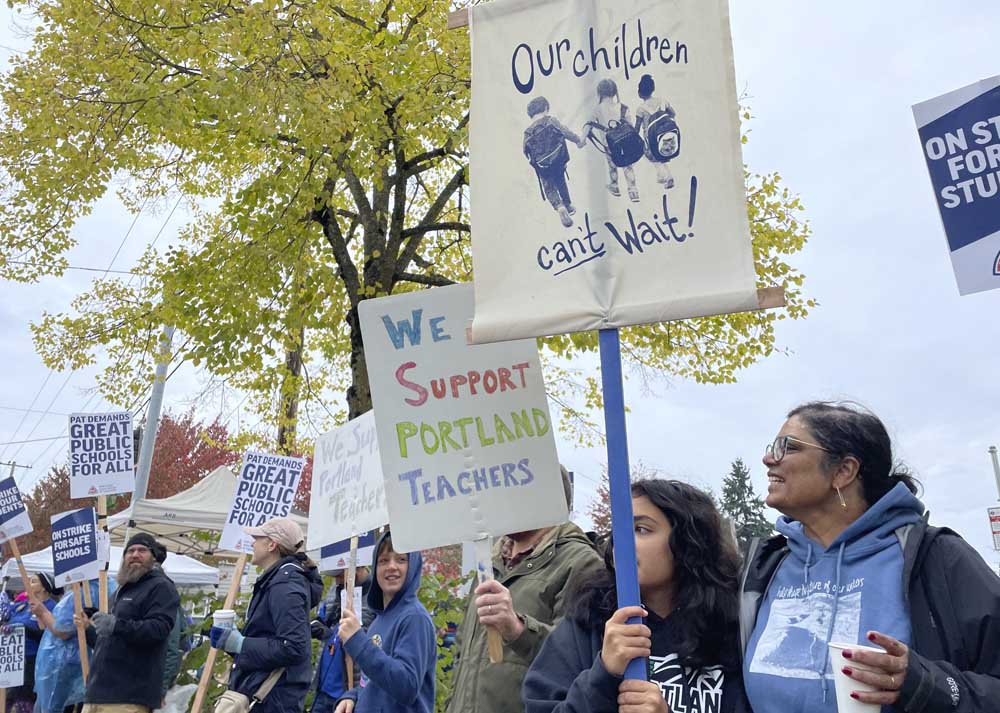Survey: Oregonians support striking teachers, think schools should have kids reading by third grade
Published 2:50 pm Monday, February 12, 2024

- Teachers and their supporters hold signs, chant and rally the crowd Nov. 1 on the first day of a teacher's strike in Portland.
Oregonians largely support striking teachers more than their unions, want schools to ensure students can read by third grade and don’t think the Legislature should hold greater authority to intervene in district budgets or teacher bargaining, according to a new survey.
The nonprofit and nonpartisan Oregon Values and Beliefs Center collected survey responses from more than 1,800 adults across the state from Dec. 19 to Jan. 7, several weeks after the Portland teachers strike ended. Oregonians were asked about their attitudes towards the teachers and state and district leaders, as well as their attitudes about schools and legislative authority. Nearly half of respondents live in the Portland metro area.
Trending
The strike, which lasted more than three weeks, was the first in the history of the state’s largest district. The teachers gained average wage increases of more than 14% total over the next three years, more time for lesson planning and the creation of committees to oversee class sizes.
The strike left most survey respondents with a “negative view” of the Oregon Education Association, the state’s largest teachers union, as well as the Portland School Board, the Legislature and Gov. Tina Kotek. Portland teachers, however, fared better. A slightly larger share of respondents had a more positive view of Portland teachers after the strike. Respondents were not asked about the Portland Teachers Association, the union representing the 4,500 educators in the district.
In open-ended questions, respondents who expressed support for the teachers and the state teachers’ union overwhelmingly cited the difficulties of being a teacher and the challenges and inadequacies of public school systems.
“There’s enough money and funding in the state to cover education costs. The problem is management and priorities set by the governor and the Legislature,” a Latino respondent from Multnomah County wrote.
Those who responded critically to the strike and the unions expressed criticism toward unions in general. Many respondents outside of the Portland metro area said they did not have strong opinions about the strike or any of the involved parties.
The bulk of respondents, seven in ten, said the strike could have been avoided if the school district and the teachers had approached bargaining differently.
Trending
When it comes to perspectives related to student outcomes and school financing statewide, the survey showed that Oregonians want schools to ensure students meet certain benchmarks for learning, but are uncertain about the role the state should play in regulating their budgets.
More than 80% of respondents across all ethnic and racial groups, political affiliations, educational levels and income groups said schools should ensure all kids can read proficiently by the end of third grade.
Oregonians seem to be split on the role the Legislature should play in regulating school district budgets and bargaining with teachers unions. About 40% supported the state exercising more authority over district budgets and bargaining, while 43% opposed state intervention.
The Legislature this summer passed the largest state school fund budget ever allocated: $10.2 billion over the next two years, including historic investments in efforts to improve student reading and writing. It is still more than $1 billion less than the state’s Education Quality Commission estimates is required to operate “a system of highly-effective schools.”








